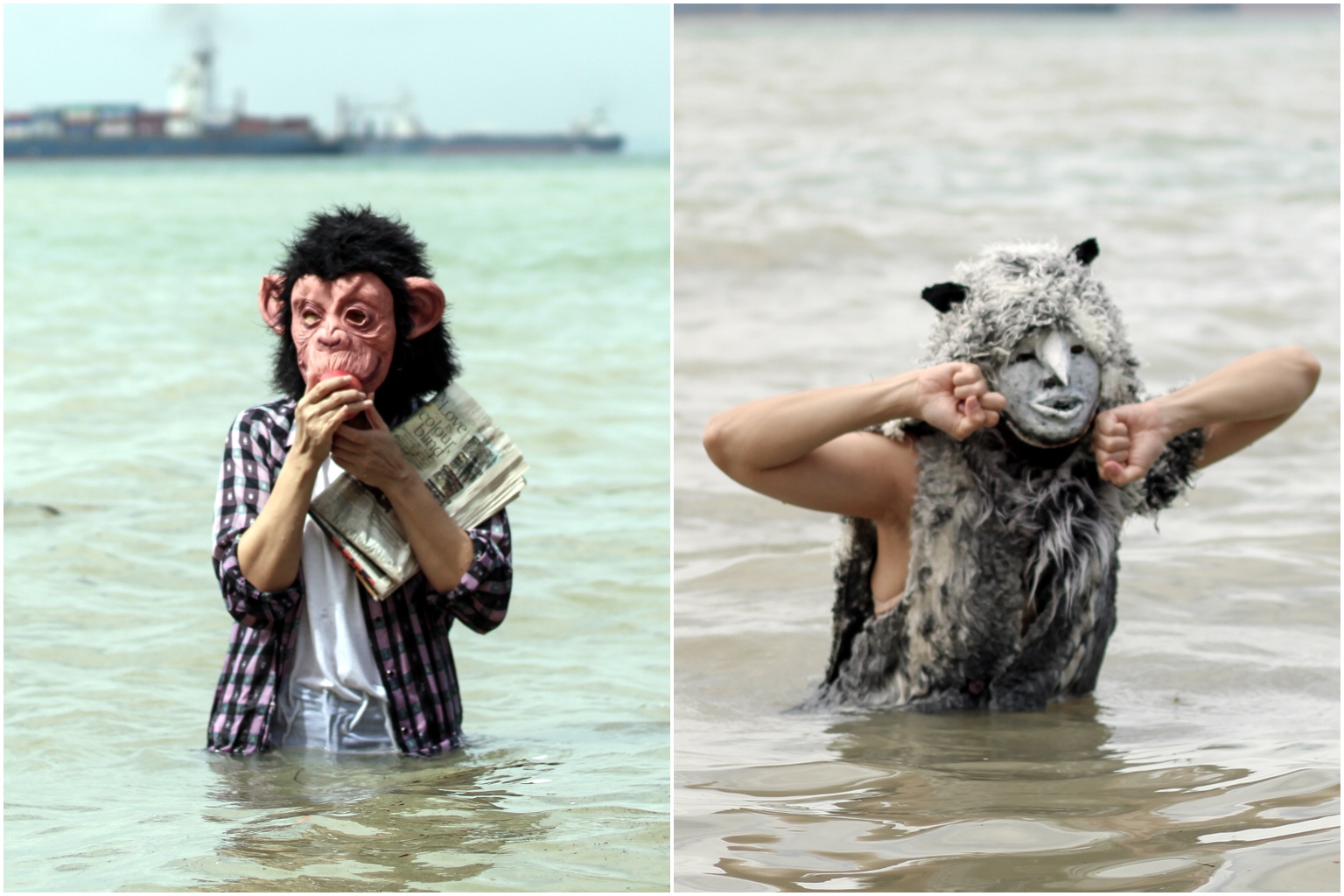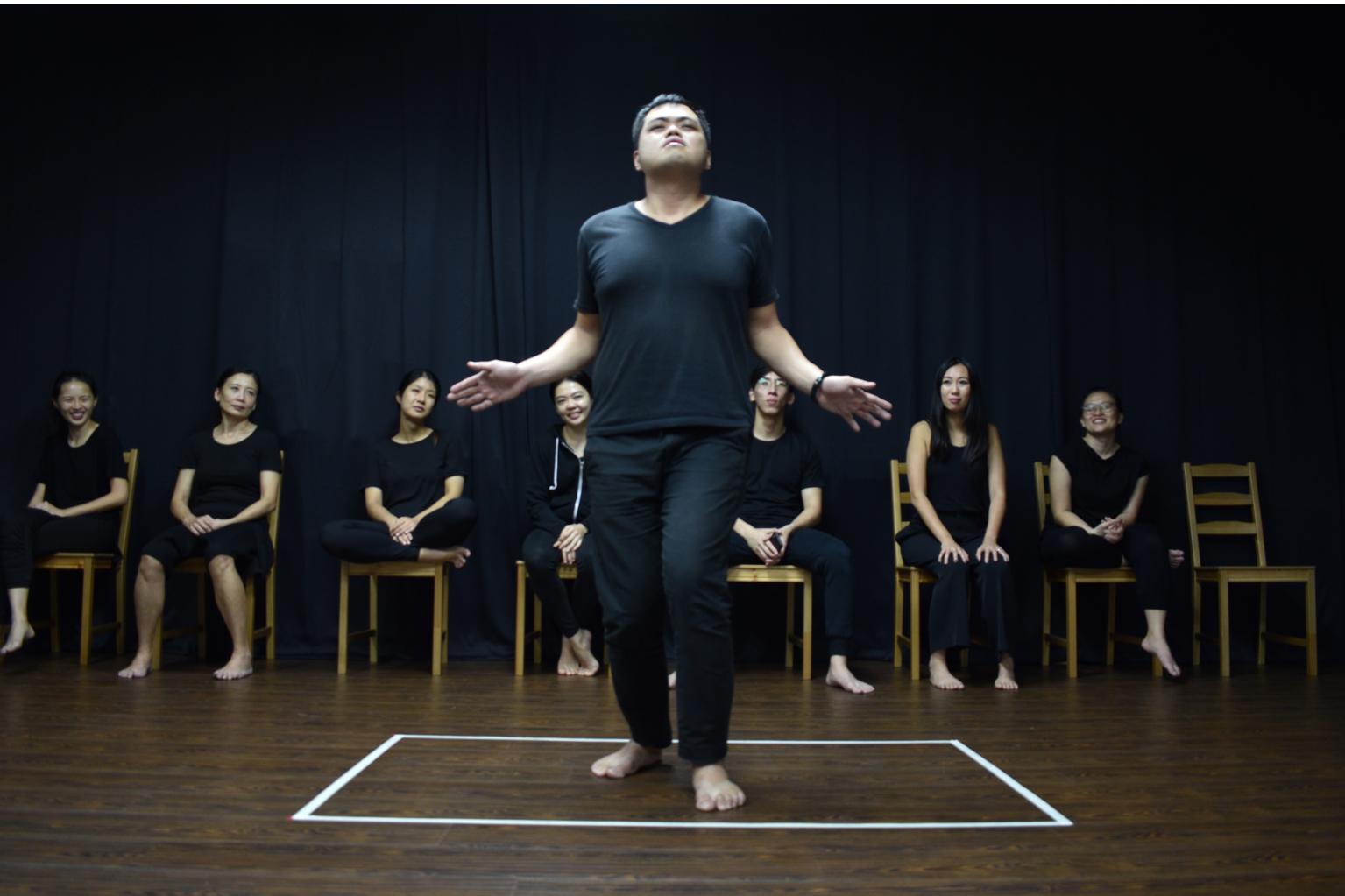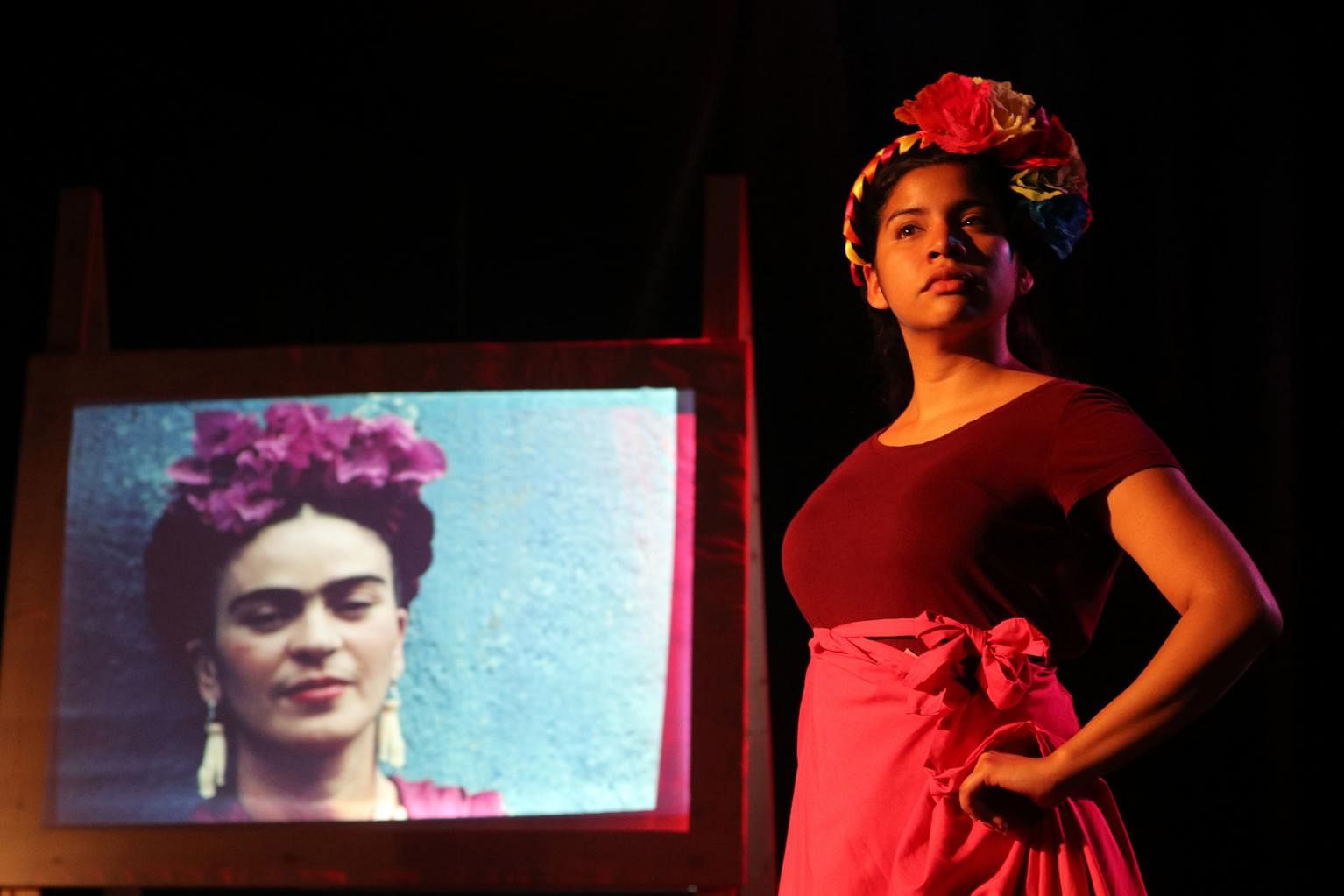M1 Singapore Fringe Festival 2021 explores idea of change from the middle ground
Sign up now: Get ST's newsletters delivered to your inbox

A Line Could Be Crossed And You Would Slowly Cease To Be by Australia-based playwright Andrew Sutherland.
PHOTOS: RACHEL LIM HUE LI
SINGAPORE - When the M1 Singapore Fringe Festival returns from Jan 20 to 31, Singaporean and international artists will present works dealing with issues such as climate change, blind obedience and the censorship of women's writing.
There are eight theatre productions and a webinar. Shows will be staged live at the Esplanade and Nanyang Academy of Fine Arts, and streamed via video-on-demand on Sistic Live.
This year's theme is Quiet Riot, which artistic director Alvin Tan, 57, says is a response to the political environment in Singapore.
The organisers were interested in the idea of changing systems from within and in questioning the political efficacy of doing so.
"There are things like politics with a capital P, and cultural politics like feminism, challenging patriarchal mechanisms and things which in Singapore are more tolerable - people don't get into trouble for it," Tan adds.
"There's a whole spectrum. We thought Quiet Riot would be able to explore that spectrum rather than just gravitate towards politics with a capital P."
The annual festival, now in its 17th edition, is organised by theatre company The Necessary Stage and has Tan back at the helm. Sean Tobin, the former head of theatre at the School of the Arts, led the event from 2015 to 2020.
Tan adds: "My hope is that we identify the middle ground because the world is so easily polarised. Look at America - it's gun versus anti-gun, pro-life versus pro-choice, fundamentalist Christians versus LGBTQ.
"Those in the middle ground are not speaking up because they don't feel safe. When there is no middle ground, it is very difficult to negotiate, to have meaningful dialogue.
"With Quiet Riot, people who are not extremists, who do not like protests, can find a space to still believe in improving society.
"And maybe people who are protesting, who might not feel that it is fruitful in Singapore, might come to the middle ground to see how it can be done within the system."
This year's festival will also be more accessible than before.
Some live performances will come with features such as audio description and open captioning. All videos on demand will have closed captions. A quiet space - where people can retreat to if they feel overstimulated - will be provided near each performance venue.
The Straits Times takes a closer look at four productions.
A Line Could Be Crossed And You Would Slowly Cease To Be
The threat of climate change looms large in this play by Australia-based playwright Andrew Sutherland.
It consists of several narratives - a same-sex couple in a rocky relationship, another couple who are newly in love, and a storyline where a goddess searches for her son and laments her impending death. Otters, seagulls and sea turtles make frequent appearances.
"What if we cross that line as we go towards that unimaginable thought of extinction?" asks director Koh Wan Ching.
"How do we hold on to hope? What is hope when we face such imminent destruction or erasure?"
The work was first performed in 2019 by eight students from the Intercultural Theatre Institute and two guest artists, to positive reviews.
The latest staging, which Koh, 40, describes as "more streamlined and quieter", features actors Grace Kalaiselvi, Irfan Kasban, Jeramy Lim, Liz Sergeant Tan and Shahid Nasheer. They double as human and animal characters.
"You see a much clearer interconnection between the human and animal worlds," Koh adds.
The production was complemented by two public workshops that ended recently.
Intimate Catastrophes, which Sutherland ran on Zoom, looked at various ways of responding to ecological phenomena in writing.
In the other workshop, Everything Is Connected - On Devising, Koh spoke about how she works with environmental concerns in her theatre-making.
What worries her most about the climate crisis?
"I feel there is not enough work being done on mitigation," she says. "How can we change the way we are functioning?
"Can we slowly transition our economy towards a more care-based one, one that is less focused on production and economic development?"
Theatre, too, has a role to play.
"We can't solve problems, but what we can do is get people to come together and think about it.
"The thing about theatre is to not offer solutions, but acknowledge that these issues are complex."
Havoc Girls and Kamikaze Boys

Young people living through socio-political upheavals take centre stage in this multimedia play inspired by real events.
The production, directed by Brian Gothong Tan, has three main narratives inspired by three world events - the Arab Spring, a wave of protests and uprisings in the Middle East and North Africa from 2010 to 2012; the 2018 rescue of members of a junior football team who were trapped in a cave in Thailand; and the Hong Kong protests that took place in 2019 and 2020.
Tan, 40, hopes the play will get the audience "thinking about the (political) systems we live in that both nurture and kill us".
"There's no such thing as a perfect system," he adds. "The current situation (in Hong Kong) was made by political forces 50, 100 years ago - even longer if you want to extrapolate more.
"We are all interconnected somehow and have a role to play. We are not all just passive citizens of the world, just reacting to this news, even though it seems far away."
Images of ancient cave paintings, photos of Hong Kong in the 1980s and more have been woven into Tan's multimedia projections. Some scenes were also pre-recorded - the Hong Kong protests, for instance, will be shown in a stylised slow-motion sequence.
The play was written by Nabilah Said, 35, and will be performed by undergraduates from the Nanyang Academy of Fine Arts.
Nabilah says it was a challenge to decide how much detail to include.
"Each of these events could have been a play or a six- to eight-hour-long documentary on their own. I was - and still am - afraid of misrepresenting or oversimplifying the stories and events," she adds.
"At the same time, how much creative licence am I allowed to exercise? That's still a question I am asking myself."
The play also tries to capture the human side of these serious socio-political events.
"Something I told the students during one of the rehearsals," Nabilah adds, "is that during a revolution, people are falling in love, getting married, breaking up with their boyfriends, having fights with their parents.
"They are still having the real-life issues you and I are having."
Offstage 3.0

In this experimental production, 10 actors will construct and deconstruct a stage - literally and metaphorically - as they take a self-reflexive look at the value of theatre.
"You will see 10 actors on stage, playing different roles, but at the same time also being themselves," says Liu Xiaoyi, 38, artistic director of the Emergency Stairs theatre group.
"The main objective is to question what the value of theatre and art-making is and how to measure it."
Offstage 3.0 is the third iteration of a project by Emergency Shelter, the training and research platform of Emergency Stairs.
In 2018, Offstage 1.0 reimagined offstage roles as characters. And in 2019, Offstage 2.0 opened up its creation process to audience members, although the final performance was subsequently staged behind closed doors, sans audience.
The Emergency Shelter artiste training programme, Liu says, aims "to transform actors into creators, and then into leaders".
"So you care about not just what's happening in the rehearsal room and on stage, but also about what's offstage and outside the theatre. Hence 'offstage'," he says, adding that these wider concerns could encompass issues such as arts housing, funding and policies.
As for Offstage 3.0, he hopes it will function as a piece of criticism.
"I don't think there is enough space for criticism in Singapore. We don't have enough commentary on what we are doing, therefore it is just one production after another," he says.
"Sometimes we need to stop and look back, and question ourselves, our peers, our policies, our reviewers."
I, Frida

Ecuadorian theatre artiste Yulissa Campos moved to Canada for university about eight years ago and later spent some time as a settlement worker, helping other newcomers such as immigrants and refugees find their feet.
Her story - and those of the people she encountered - are woven into the warp and woof of I, Frida, her one-woman show about a young woman from Venezuela who migrates to Canada and tries to fit in.
The protagonist, an activist for immigrants' rights, draws inspiration from two figures - her mother and the late Mexican painter Frida Kahlo. The comedic play, which incorporates elements of magic realism, debuted at the 2019 Saskatoon Fringe Festival.
Campos, 26, founded Ay, Caramba! Theatre, which is based in the Canadian city of Saskatoon and which seeks to diversify Canadian theatre through Hispanic stories.
She had wanted to perform the play in Singapore, but the Covid-19 pandemic put paid to that. As a result, the play was filmed at a local theatre in Saskatoon and will be shown online at the M1 Singapore Fringe Festival.
Immigration and displacement are common issues, Campos says, noting that the people who move are simply seeking a better life.
"I feel the outside world thinks that in Canada, we open the borders to everybody. But there's a certain standard and qualifications refugees need to have in order to be sponsored. That is another thing I would like to share in my play - that nothing is granted for free," she adds.
"I think that's the greatest misconception, that refugees are just benefiting from the government and not giving anything in return. But the reality is that they also have to pay their own share."
She hopes audiences in Singapore identify with the play and that it sparks conversations.
"We have all been new in a different home, in a different city. You don't need to be a newcomer to identify with what it's like to be different in a new place," she says.
"The main message in the play is that we are all longing for home and finding who we are, no matter where we are."
M1 Singapore Fringe Festival: Quiet Riot
WHERE: Sistic Live; Zoom; Esplanade - Theatres on the Bay, 1 Esplanade Drive, Theatre Studio, Level 4; Nafa Studio Theatre, Nanyang Academy of Fine Arts, Campus 3, 151 Bencoolen Street
WHEN: Jan 20 to 31
ADMISSION: $27 (in-theatre tickets, concessions available) or $15 (video-on-demand), via Sistic (sistic.com.sg or call 6348-5555); free with registration (for the webinar Quiet Riot: Agitating For Change From Within). You can also pay $95 to access all digital streams of performances throughout their screening periods.


